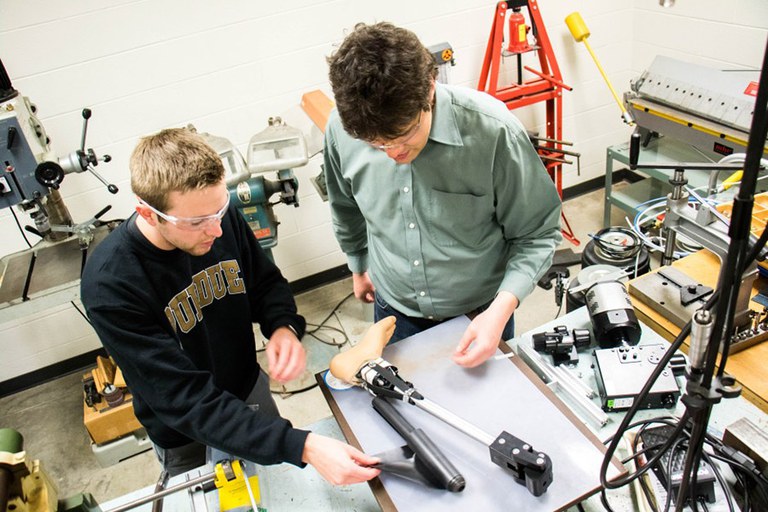Gain Valuable Skills in Interdisciplinary Engineering
Purdue University’s innovative online Master of Science in Interdisciplinary Engineering (MSE/MS) degree empowers professionals to tailor their educational experience to their unique goals and exposes them to a wide variety of issues and topics relevant to current engineering trends and the future of the field.
This online program provides professionals offers a highly customizable plan of study with the choice of 11 concentrations and with 200+ engineering courses taught by expert faculty who work at Purdue’s flagship campus. Every plan varies based on your interest, time, and course load.
Set yourself apart from the competition by joining a unique and flexible engineering program that is consistently ranked in the top three best online programs by U.S. News and World Report.
Why earn your Master's in Interdisciplinary Engineering?
Within the engineering field, there are multiple factors increasing the demand for professionals who have interdisciplinary skillsets. These include:
- Technological advancements and developments in engineering methods and processes require interdisciplinary expertise to master.
- The increasing need for engineers to engage with stakeholders and translate complex ideas to different audiences.
- Employers want engineers who have a range of practical skills, and many engineering jobs require cross-training and require engineers to work on diverse teams.
The academic study, Supporting the Development of Engineers’ Interdisciplinary Competence, suggests that engineers with interdisciplinary skillsets have more success in the workforce and on diverse engineering teams compared to engineers without interdisciplinary experience. Interdisciplinary engineering programs expose students to a wide variety of different engineering problems, which can help them better understand their own interests and the scope of the field as a whole.
However, engineers who want focused careers in areas like systems engineering or materials engineering can also benefit from an interdisciplinary degree. That is because this program lets students cast a wide net or focus their degree on a specific niche area – students can take a wide variety of courses or pick a specific concentration
Want to know more about the importance of interdisciplinary engineering skills or academic study? Read our blog.
Curriculum
This degree requires 30 credit hours total with at least 18 hours of Purdue graduate engineering courses. A maximum of 12 credit hours can be taken in specific non-engineering courses such as math, statistics and/or transfer courses (subject to review).
The degree awarded is either the Master of Science in Engineering (MSE) or the Master of Science (MS), depending upon your undergraduate degree; the major is Interdisciplinary Engineering.
After you begin your studies at Purdue, an academic advisor will provide you with tools to map out a plan of study and help you define a concentration tailored to align with your specific goals.

Available Engineering Concentrations
You can add up to two optional engineering disciplines, also called concentrations. Concentrations can help narrow your focus and are driven by emerging technical fields in order to give students an immersive interdisciplinary experience. Each concentration is packaged within the MSE/MS Interdisciplinary Engineering degree and follows unique requirements met within the overall base degree requirements. A concentration shows up on your transcript, not your diploma.
Detailed concentration information including a program overview and curriculum requirements can be found by reviewing the individual concentrations listed.
Other Interdisciplinary Engineering Options
Master of Science in Autonomy
Master of Science in Internet of Things
Master of Science in Microelectronics & Semiconductors
Master of Science in Robotics
Master of Science in Systems Engineering
Doctor of Engineering
Dual Master of Science in Interdisciplinary Engineering + Indiana University Master of Business Administration
Nondegree Options
Courses - To advance your skillset or prepare for a career transition, take one or more courses as a nondegree student.
Certificates - A certificate in a specialized area will deepen your knowledge and skill set, while broadening your professional opportunities.
Admissions Requirements
Criteria for Admissions
- Minimum GPA of a 3.0
- Math Background: One semester each of Calculus I, Calculus II and either Linear Algebra or Differential Equations
- Engineering Background: Preferred undergraduate degree in Engineering, Science, Mathematics or Technology.
Application Requirements
- Transcripts from all universities attended
- 3 letters of recommendation
- Academic Statement of Purpose
- Personal History Statement
- A professional resume
- Math prerequisite checklist, if applicable
- Full admissions requirements
Application Deadlines
For Fall Start:
- August 1
For Spring Start:
- December 1
For Summer Start
- May 1
Tuition*
Resident of Indiana
- $1,139 per credit hour
Nonresident of Indiana
- $1,459 per credit hour
Domestic students and permanent residents may qualify for the following types of financial aid:
- US federal financial aid
- Military, veterans, and military-connected students
*The cost of attending Purdue varies depending on where you choose to live, enrollment in a specific program or college, food and travel expenses, and other variables. The Office of the Bursar website shows estimated costs for the current aid year for students by semester and academic year. These amounts are used in determining a student’s estimated eligibility for financial aid. You can also use our tuition calculator to estimate tuition costs.
Frequently Asked Questions
What degree would I earn with the Online program?
You would earn a Master of Science or a Master of Science in Engineering.
How can I have transfer credit reviewed and applied towards my program?
Transfer credits will be officially reviewed for transferability after admission with academic and faculty advisors. Course descriptions and syllabi will be required. 12 transfer credits can be utilized for the Interdisciplinary Engineering (IDE) programs; the amount accepted will vary depending on a student’s concentration and plan of study. Approved credits will be applied within a student’s electronic Plan of Study as electives. Transfer credits can only be applied towards IDE majors and not graduate certificates. If a student transfers to a program outside of IDE within Purdue's College of Engineering, previously honored equivalencies and transfer credit approval is not guaranteed. Students should inquire further with their new program.
In order for courses to be evaluated for transfer, they must first meet all of the following requirements:
- Graduate level from an accredited institution
- Never used towards a previous degree program
- Engineering or STEM-related courses
- A grade of a B- or better
- Students typically need to be an active graduate student within the last 5 years for credit to be utilized.
Once admitted, students will work with their advisor to discuss the academic history and possible transfer credit.
Is there a minimum course registration required each semester?
You need to register for at least one credit to be considered an active student. If you do not enroll for more than two consecutive semesters, you will lose your student status and must reapply.
Are all courses available every term?
No, all courses are not available every term. You can see our course availability on the Courses List page.
How long does it take to finish the program?
The program requires 30-33 credits. You may complete the program as a full time or part time student. A full-time student takes at least 8 semester credit hours every term and may be able to complete this program within 12 to 18 months. A part time student takes less than 8 semester credit hours every term (on average 3-6). As a part-time student, you may complete the program within 2 to 4 years. The average time to complete the program is 3 years.
Can I take time off during my program?
You may take a maximum of two consecutive semesters off. If you take more than two semesters, you will need to reapply to the program.
Are letters of recommendation from employers acceptable?
We suggest that you try to get at least one academic reference. If that is not possible, recommendations from employers will be accepted.
How are the online courses structured?
The courses will be offered asynchronously. We upload recordings of live lectures for you to view on your time. You will follow along weekly to complete your assignments, projects, and/or exams. Exams may require a proctor (virtual or in-person depending on the faculty).
Are scholarships or funding offered for students?
Scholarships and funding are not available through Purdue as this program is a course-based, self-funded master's program. U.S. Citizens and Permanent Residents are eligible for federal financial aid. The Purdue Division of Financial Aid can answer your questions. Veterans can visit the Dorothy Stratton Veteran and Miltary Success Center to learn more about wrap-around support services for Purdue students who are veterans, members of the military, or benefit-using family members.
Is there prerequisite coursework required for this program?
Please visit the admission criteria page for information.
Are there career services or resources after graduation?
Yes, students will have access through the Purdue Center for Career Opportunities.
What kind of academic and professional development support does Purdue University offer for online students?
Students enrolled in the online Master of Science in Interdisciplinary Engineering, which is supported by Purdue University, receive robust support from a dedicated team of student engagement professionals. All students have an assigned academic advisor, who is available for one-on-one support and helps students with academic-related questions or issues. Academic advisors also offer workshops on topics relevant to academic planning and preparation, including plan of study workshops and specialty info sessions for students enrolled in specific programs.
Additionally, students have an assigned student success coach, whose role is to support students who may be struggling in the online learning environment. Students have access to their assigned success coach from the point they accept their offer of enrollment through graduation. Success coaches also work to build community among online students, including offering networking events, resources, and opportunities for professional development.
Is there a minimum grade point average required to complete the Degree?
A graduate student is expected to maintain a graduation index representing a B average (3.0/4.0 GPA) or better. A student's 30 credits of graduate coursework must be cumulatively calculated at a 3.0 or higher in order to receive the Degree.
For more details on policies and grading information, please visit: Policies and Procedures for Administering Graduate Student Programs - Purdue University - Modern Campus Catalog™ - see section VI for grading policies.











